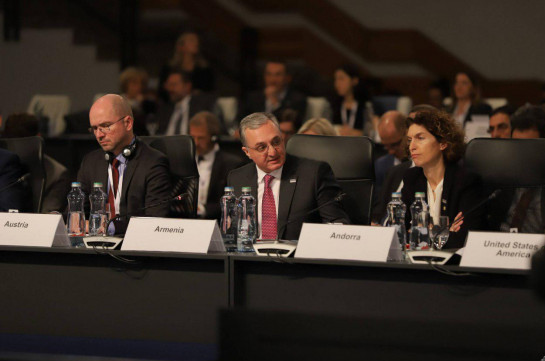
05/12/2019 16:52
Armenia’s FM presents Armenia’s position over peaceful settlement of Karabakh conflict
Armenia’s Foreign Minister Zohrab Mnatsakanyan, after regular consultations with the Azerbaijani Foreign Minister Elmar Mammadyarov and OSCE Minsk Group co-chairs presented the position of Armenia on the key aspects of the peaceful settlement of the Nagorno-Karabakh conflict in his speech at the 26th Ministerial Council in Bratislava today.
The minister particularly stressed:
“First, there is no alternative to the peaceful settlement of the conflict within the OSCE Minsk Group Co-Chairmanship, a format which is internationally mandated and supported.
Second, the inalienable right of the people of Nagorno-Karabakh to self-determination represents a fundamental principle and foundation for the peaceful resolution. The recognition of this principle not to be limited in the scope of determination for the final status of Nagorno-Karabakh must be clearly and unequivocally accepted. The term “without limitation” clearly implies also the right of the people of Nagorno-Karabakh to maintain and determine a status outside the jurisdiction, sovereignty or territorial integrity of Azerbaijan. The persistent hostile policies and actions of Azerbaijan aimed at undermining and threatening the existential physical security of the people of Nagorno-Karabakh, including the latest attempted aggression by Azerbaijan against Nagorno-Karabakh in April 2016, emphasize the illegitimacy and impossibility of claiming jurisdiction by Azerbaijan over the people of Nagorno-Karabakh.
Azerbaijan must assume direct commitment to recognition of the right to self-determination of the people of Nagorno-Karabakh by way of legally binding free expression of the will of the people living in Nagorno-Karabakh, the outcome of which should have no limitation.
Third, the security of the people of Nagorno-Karabakh will not be compromised. Under no circumstances the people of Nagorno-Karabakh should be left without secure lines of defense. There will be no condition assuming a risk to existential physical security of the people of Nagorno-Karabakh as it was the case in 1991-1994 and in 2016. To underline this point, I refer to the situation in the territories of Nagorno-Karabakh, presently occupied by Azerbaijan, in which Armenians were ethnically-cleansed and territories were completely resettled by Azerbaijanis. This reality has recently been presented by the leadership of Azerbaijan as a good example of a settlement of the Nagorno-Karabakh conflict.
Fourth, the peaceful settlement should be inclusive by directly engaging all the parties to the conflict. Therefore, Nagorno-Karabakh through its elected representatives should be a direct party to the negotiating process. In this respect, we emphasize the necessity of full engagement of the elected representatives of Artsakh in the peace process, particularly on the core issues of substance. The government of Armenia will never engage in any activities which can violate the right of the people of Nagorno-Karabakh to freely determine their political status or can deprive them of the ownership of this process.
Fifth, peaceful settlement cannot take place in an environment of tensions and risks of escalation. Therefore the 1994 and 1995 ceasefire agreements concluded between Azerbaijan, Nagorno Karabakh and Armenia should be strictly adhered to and strengthened. Risk reduction mechanisms, including the OSCE mechanisms investigating ceasefire violations and monitoring ceasefire regime, including by way of expanding the office of the PRCiO should be implemented.
Sixth, the basic principle of non-use of force or threat of use of force should be unconditionally adhered to. The policies of hatred, intolerance, xenophobia, Armenophobia, instigated and directed by the leadership of Azerbaijan should be denounced. Efforts should be reinforced to prepare populations for peace and to establish an environment conducive to peace.
Seventh, the maximalist positions of Azerbaijan, which ignore the will and sensitivities of the people of Nagorno-Karabakh are fundamental obstacles to a meaningful progress in the peace process. The inability of the authorities of Azerbaijan to reciprocate the call for a compromise by Armenia is a point in case. To remind, the Prime Minister of Armenia demonstrated strong political will in announcing that any settlement should be acceptable to the people of Armenia, Artsakh and Azerbaijan, which is to say that the settlement can be only based on a compromise," Mnatsakanyan stated in his speech.
Armenia's FM also stressed that Armenia remains engaged in good faith in the negotiating process and will continue to consistently work towards the peaceful settlement.
"At the same time, it is unacceptable that in light of the present domestic political developments in Azerbaijan, the latter sets out preconditions for the peace process, as manifested in a position paper circulated on the eve of this Ministerial Council. Armenia rejects such non-constructive approach. Finally, in the past month we have demonstrated a modest, and yet important example of confidence building between all the parties to the conflict. The exchange of journalists from Armenia, Nagorno-Karabakh and Azerbaijan is a promising example of building trust and inclusive dialogue between the parties at the public level. We are ready to further build on this example. Also, the relatively low level of violence along the line of contact and the international border, as well as the use of direct communication line should be sustained and enhanced. However, we remain seriously concerned that despite these measures, there have been losses and injuries which could have been avoided. Delivering on the commitments is key in building trust towards the prospects for the final settlement of the conflict," Armenia's FM stressed.








